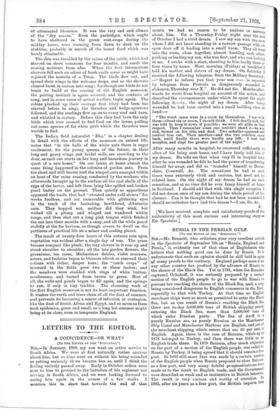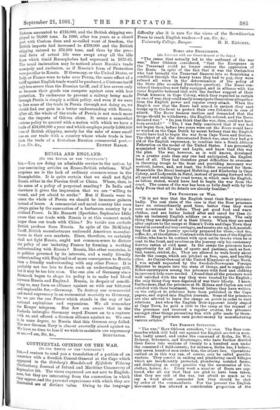RUSSIA IN THE PERSIAN G-ULP.
[To TEE EDITOR OF THE " SPECTATOR...1 Sin,—Mr. Bennett, who criticises your very excellent article in the Spectator of September 7th on " Russia, England, and Persia," is evidently one of that class of Englishmen who believe that nothing good can be done by Russia It is unfortunate that such an opinion should be still held in spite of many proofs to the contrary. England perhaps more llan any other country has profited by the advance of Russia to the shores of the Black Sea. Yet in 1791, when the Russians captured Ochakoff, it was seriously proposed by a certain section of the English people to go to war with Russia to prevent her reaching the shores of the Black Sea, arch a step being considered dangerous to English commerce in the East, especially to that with Turkey. At that time no English merchant ships were so much as permitted to enter the Black Sea, but as ene result of Russia's reaching the Black Sea there are to-day 5,000,000 tons of British shipping yearly entering the Black Sea, more than 3,000,000 tons of which enter Russian ports. The Sea of Azoff is purely Russian sea, as purely Russian as the Manchester Ship Canal and Manchester Harbour are English, and yet of the merchant shipping which enters that sea 65 per cent. s English. Again, there is the case of Batoum, which np to 1878 belonged to Turkey, and then there was little or no English trade there. In 1879 Batoum, after much objection on the part of a section of the English people, was ceded to Russia by Turkey, it being agreed that it should remain a free port. In 1886 still more fuss was made by a certain section of the English people when Russia proposed to close Baton's as a free port, and very many doleful pr ognostications were made as to the result to English trade, and the Government were described as weak and as inattentive to British interests. The result is very curious and worthy of attention.. In 1885, after six years as a free port, the British imports Into Batonm amounted to 2116,000, and the British shipping em- ployed to 70,000 tons. In 1896, after ten years as a closed port with Custom dues and so-called want of freedom, the British imports had increased to 2358,000 and the British shipping entered to 376,000 tons, and thus by the prac- tical facts of actual life were swept away all the idle fears which timid Russophobes had expressed in 1879-85. The usual insinuation may be noticed about Russia's trade monopoly and exclusion, as if Russia's form of Protection were peculiar to Russia. If Germany, or the United States, or Italy, or France were to take over Persia, the same effect of a tariff against English trade would be produced, a Customs tariff only less severe than the Russian tariff, and if less severe only so because their goods can compete against ours with less protection. To endeavour to prevent a railway being made through Persia is simply a selfish policy, and even if we were. to lose some of the trade in Persia through not doing so, we should find our gain in a better understanding with Russia. After all, the whole of the trade of Persia is not much more than the imports of Odessa alone. It seems a somewhat curious policy to quarrel with a nation with which we have a trade of 234,000,000 a year and which employs yearly 5,000,000 tons of British shipping, merely for the sake of some small loss on our trade with a country whose whole trade is less than the trade of a first-class Russian commercial port.—







































 Previous page
Previous page